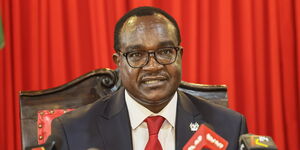The government has once again stepped in to ease concerns over contentious university funding, extending the funding application deadline for the 2023 KCSE cohort.
This move comes amid criticism of the new University Funding model, which Principal Secretary for Higher Education and Research, Beatrice Inyangala, staunchly defended. “Education has never been more affordable,” she asserted during an interview on Citizen TV on Monday.
The extension, which shifts the deadline to August 15, 2024, aims to accommodate the significant number of students yet to apply for the much-needed financial assistance.
“We are pleased to announce that the application process has been extended by ten days, closing on August 15, 2024,” Inyangala stated in a statement on Monday evening.
Critics of the new funding model have voiced concerns over its complexity and transparency. Inyangala, however, refuted these claims during an appearance on Citizen TV, arguing that the model is designed to make education more accessible.
“Education has never been more affordable,” she asserted, highlighting that vulnerable families will only need to contribute Ksh 6,000 annually.
The model categorises students into five bands based on their financial need. Those in band one, representing the most vulnerable, receive 95 per cent government support. “For a student from a vulnerable background in band one undertaking a BA program, they will not pay more than Ksh 6,000 a year,” Inyangala emphasised.
This model starkly contrasts with the previous Differentiated Unit Cost (DUC) system, which allocated block funding to institutions.
As of August 4, 2024, government data revealed that 79,038 university students had applied for both loans and scholarships, while 74,237 students had yet to submit their applications.
The Ministry of Education had initially opened the application portal on June 18, 2024, signalling a proactive approach to student funding.
Despite the positive aspects highlighted by the government, the roll-out of the new funding framework has not been without challenges. Disinformation regarding program costs and parental contributions has created confusion.
Dr. Beatrice Muganda Inyangala addressed this issue, stating, “There are no bottlenecks in the applications for scholarships and loans; however, there has been a lot of disinformation and misinformation about the program cost and how it relates to the fees that the parents will pay.”
The new funding model, which replaces the DUC system, incorporates a more nuanced approach to financial assistance. Scholarships provided by the Universities Fund (UF) range from 30 per cent to 70 per cent, depending on the student’s level of need. The Higher Education Loans Board (HELB) supplements these scholarships with loans, ensuring that all financial gaps are bridged.
KUCCPS has placed 153,275 students from the 2023 KCSE cohort into public and private universities. However, government support hinges on students applying for funding.
Inyangala’s assurance that no fees should be paid until the categorisation process is complete offers some relief. The government’s pledge to cover 60 per cent to 95 per cent of the costs based on income levels is a significant step toward equitable education. The remaining costs will be borne by households, capping parental contributions at 40 per cent.
This funding model’s success will depend on clear communication and effective implementation. The utilisation of the Means Testing Instrument (MTI) to assess financial needs is central to ensuring that resources are allocated fairly. The collaboration between UF, HELB, KUCCPS, and the State Department for Technical and Vocational Education and Training aims to streamline this process.












